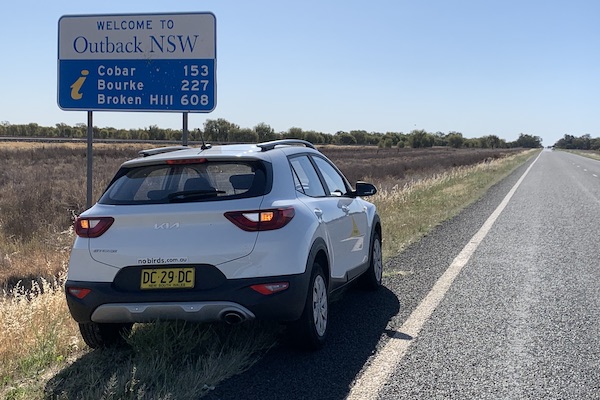
Test Drive: Kia Stonic
Today we drive the Kia Stonic through Outback New South Wales to see if Kia continues to perform well after we tested the Cerato, Seltos and Sportage. Indeed these test drives were all rather impressive so the bar is high for the Stonic.
Exterior design follows the standards of urban SUVs, even if its playground remains firmly on sealed roads. The Stonic features higher ground clearance, blackened underbody and wheel arches, striking front, silver bash plates and roof rails that follow the inclination of the windshield. The back of the car looks particularly rugged with its imposing bash plate. Added to that are a long hood, narrow side windows and a contained height (1,50m). The Stonic is already 6 years old, even if it reached Australia only a couple of years ago (January 2021), so its front design is a little old fashioned now.
What is the Stonic like to drive? The Stonic does everything well, note its suspension has been tailored to fit Australian roads, so the handling is satisfying. However a big downside is the gearbox revving up like a monster when accelerating. And accelerating is slow. Overtaking a road train is a challenge which is a real handicap in the outback. What creature comforts does the Stonic have? It features forward collision warning (it worked), an overzealous and frankly annoying lane-keep assist, lead vehicle departure alert (it worked too) and six airbags among other things. Note the cruise control is not adaptive.
The dashboard is relatively cheap (but this is a rental after all), with a lot of plastics and hard surfaces. The dials are analog and the gearbox standard. There’s a reasonably large infotainment screen and the Bluetooth connection works well. The cruise control commands are easy to get used to. Kia says fuel consumption of the Stonic is 6.7L/100km which is reasonable. So all in all a well designed package that loses its attraction when wanting a dynamic drive.
The Australian outback is pickup territory and I’ve seen some interesting trends during this trip. The Ram 1500 and 2500 are now very common, notably with imposing roo bars as pictured above. Priced lower than their competitors, Chinese pickups have already made their mark, such as the LDV T60 Max and the GWM Pickup (see above).


